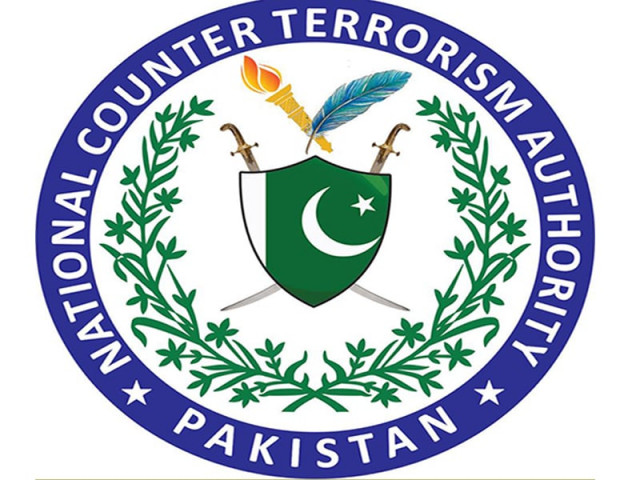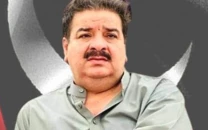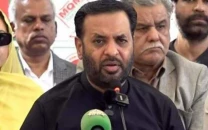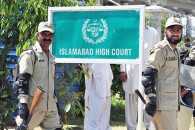‘Homeland security dept' on the cards
NACTA holds meeting after two-year gap

The National Counter Terrorism Authority’s (Nacta) board of governors on Thursday held its first meeting after a gap of two years and planned to establish an organisation at the federal level that would be similar to the Homeland Security Department in the US.
The long hiatus has ended days after the Tehreek-e-Taliban Pakistan (TTP) ended ceasefire with the government and just ahead of the anniversary of the Army Public School (APS) Peshawar attack on December 16, 2014 -- the massacre in which the terrorist body claimed the responsibility of 149 people embracing martyrdom, including 132 schoolchildren.
In its over two-year long slumber, Kabul was taken over by the Afghan Taliban and according to a report of Pakistan Institute of Peace Studies (Pips), the country witnessed a record 51% increase in the number of terrorist attacks in a year --between August 15, 2021 and August 14, 2022 -- with 433 people embracing martyrdom and 719 injured in 250 attacks across the country.
Attacks on Chinese nationals and their government's interests also increased during this period.
China had expressed concerns over the security of its nationals in Pakistan.
Also read: SC seeks NAB opinion on accountability law tweaks
Not holding a meeting of the authority's board of governors is against Section 6(4) of the Nacta Act 2013.
The section makes it mandatory that the “board may meet as and when required but it shall meet at least once in each quarter of a year”.
An official, who attended the only third board of governors meeting held since its inception in 2009 and when it was given administrative and financial autonomy in 2013, regretted that the delay in holding the huddle by respective governments reflected the non-seriousness and indifference to the threat of insurgency and terrorism.
He revealed that the most important outcome of the meeting was the proposal to create an organisation at the federal level, saying it would work just like the Homeland Security Department operated in the US.
He, however, refrained himself from confirming that the TTP ending the ceasefire and attacks on Chinese nationals had pushed the authorities concerned to convene the Nacta board of governors meeting.
At a time when there has been a surge of terrorist activities necessitating greater coordination of the interior ministry with all the stakeholders through Nacta on a war footing, Interior Minister Rana Sanaullah, who chaired the meeting, could not help but admitting that it was “very unfortunate” that the authority’s board of governors had not held a meeting for two years.
The interior minister noted that terrorism and extremism were a serious matter and the government needed to take a more responsible attitude.
He directing the authorities that Nacta should be restructured in line with its core goals and objectives; necessary legislation required for its restructuring should be completed soon; and it should be transformed to an active and effective organisation for the elimination of terrorism and extremism.
Since the TTP ended its ceasefire, it has stepped up violence, carrying out nearly 60 bomb and gun attacks in the previous month alone, including one on Nov 16 in which six policemen embraced martyrdom in Lakki Marwat district.
An official, who attended the meeting, noted that the authority's two-year-long slumber was also an indication that the previous civil and military rulers’ focus was more on politics instead of dealing with issues like terrorism and achieving the targets set in the National Action Plan and Nacta Act of 2013.
According to an official statement, the interior minister chaired Nacta’s 3rd board of governors meeting.
It read that Nacta’s National Coordinator Muhammad Tahir Rai briefed the board about structure and functions of the authority.
Also read: With judge's transfer pending, court adjourns Swati's hearing till Dec 12
It added that all administrative and financial proposals submitted by the national coordinator were discussed in detail and approved unanimously by all the board members.
During the meeting, it read, Rai proposed restructuring of Nacta within the current statutory mandate and most importantly, creation of a department at the federal level.
Though Sanaullah regretted the fact that no meeting was held for two years, the interior ministry’s statement read that he had expressed his “satisfaction” over Nacta’s performance in countering extremism and terrorism.
The statement added that various proposals on restructuring of Nacta and making it an effective organisation were discussed in the meeting.
The statement read that Sanaullah emphasised the need for Nacta playing a key role in formulating data-driven policies and strategies to support the law enforcement agencies in defeating terrorism.
The minister appreciated the coordinated efforts of Nacta for countering financing for terrorism in the context of Pakistan’s recent removal from FATF’s grey list.
He stressed upon the need to make preparations of highest level, as there was resurgence of terrorism on the western borders.
“Unfortunately, this region has been in a conflict zone for the last 40 years,” the statement quoted Sanaullah as saying.
Federal Power Minister Khurram Dastgir, ANP Senator Hidayatullah Khan, PML-N Senator Rana Maqbool Ahmad; federal secretaries of interior, defence, law and justice and finance division; director generals of the Intelligence Bureau, Federal Investigation Agency, Inter-Services Intelligence, Military Intelligence and police chiefs and home secretaries of all provinces attended the meeting as members of the Nacta board of governors.
Separately, Nacta has told a Senate panel that the TTP had gained considerable ground and increased its footprint and magnitude of activities in the country during the process of peace talks.
The authority presented its findings to the participants of a huddle of the Senate Standing Committee on Interior.
In a report submitted to the Senate panel, the authority said peace talks had emboldened the militants and their presence in Swat could be attributed to their efforts to gain the pulse of locals and response by the State.
Also read: SC opinion in Reko Diq case awaited
It noted that the US withdrawal from Afghanistan last year gave impetus to the TTP activities with its base intact in the neighbouring country.
“Overall rise in the terrorism index is being witnessed,” it added.
Nacta pointed out four recent terror incidents in Pakistan that the TTP had claimed responsibility for. They included:
In August 2022, TTP militants held LEAs hostage in Swat’s district Matta and released them after 12 hours.
In September 2022, militants fired on police in Swat.
The TTP also claimed responsibility for an IED attack on a vehicle in which a member of the Peace Committee and two policemen were killed.The abduction of seven cellular company staff members and demand of Rs10 million ransom.
The Nacta report further read that strong protests by all segments of the society in Swat was a good development. “The locals, especially the political leadership active against the militants, need to be supported and protected through institutional management,” it added.
Nacta stressed the need for the monitoring of morphing in the local population in adjoining areas and collective efforts of the security apparatus to counter the presence of militants in the area.



















COMMENTS
Comments are moderated and generally will be posted if they are on-topic and not abusive.
For more information, please see our Comments FAQ